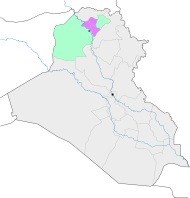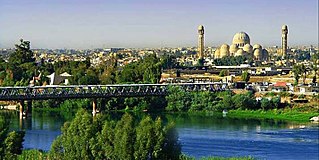
Nineveh Governorate is a governorate in northern Iraq. It has an area of 37,323 km2 (14,410 sq mi) and an estimated population of 2,453,000 people as of 2003. Its largest city and provincial capital is Mosul, which lies across the Tigris river from the ruins of ancient Nineveh. Before 1976, it was called Mosul Province and included the present-day Dohuk Governorate. The second largest city is Tal Afar, which has an almost exclusively Turkmen population.

Ankawa is a suburb of Erbil in Kurdistan Region, Iraq. It is located 8 kilometres (5 mi) northwest of downtown Erbil. The suburb is predominantly populated by Christian Assyrians, most of whom adhere to the Chaldean Catholic Church.
Karamlesh is a town in northern Iraq located less than 18 miles (29 km) south east of Mosul.
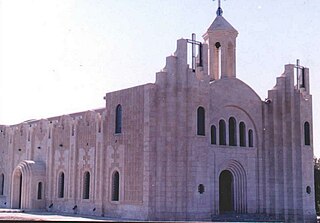
Bartella is a town that is located in the Nineveh Plains in northern Iraq, about 21 kilometres east of Mosul.

Iraqi Assyrians are an ethnic and linguistic minority group, indigenous to Upper Mesopotamia. They are defined as Assyrians residing in the country of Iraq, or members of the Assyrian diaspora who are of Iraqi-Assyrian heritage. They share a common history and ethnic identity, rooted in shared linguistic, cultural and religious traditions, with Assyrians in Iran, Turkey and Syria, as well as with the Assyrian diaspora elsewhere. A significant number have emigrated to the United States, notably to the Detroit and Chicago; sizeable communities are also found in Sydney, Australia and Södertälje, Sweden.

The Assyrian homeland, Assyria, refers to the homeland of the Assyrian people within which Assyrian civilisation developed, located in their indigenous Upper Mesopotamia. The territory that forms the Assyrian homeland is, similarly to the rest of Mesopotamia, currently divided between present-day Iraq, Turkey, Iran and Syria. In Iran, the Urmia Plain forms a thin margin of the ancestral Assyrian homeland in the north-west, and the only section of the Assyrian homeland beyond the Mesopotamian region. The majority of Assyrians in Iran currently reside in the capital city, Tehran.

Nineveh Plains is a region in Nineveh Governorate in Iraq, to the north and east of the city Mosul. Control over the region is contested between Iraqi security forces, KRG security forces, Assyrian security forces, Babylon Brigade and the Shabak Militia.

The vast majority of Christians in Iraq are indigenous Assyrians who descend from ancient Assyria, and are considered to be one of the oldest continuous Christian communities in the world. They primarily adhere to the Syriac Christian tradition and rites and speak Northeastern Neo-Aramaic dialects, although Turoyo is also present on a smaller scale. Some are also known by the name of their religious denomination as well as their ethnic identity, such as Chaldo-Assyrians, Chaldean Catholics or Syriacs. Non-Assyrian Iraqi Christians include Arab Christians and Armenians, and a very small minority of Kurdish, Shabaks and Iraqi Turkmen Christians. Regardless of religious affiliation Assyrians Christians in Iraq and surrounding countries are one genetically homogeneous people and are of different origins than other groups in the country, with a distinct history of their own harking back to ancient Assyria and Mesopotamia.
The Qaraqosh Protection Committee is an armed militia formed by Assyrians living in the city of Bakhdida, in Ninawa Governorate of Iraq. The committee, formed in 2004, was organized through local churches, and began manning checkpoints and was soon working with the Iraqi police.

Al-Hamdaniya District is a district in the north-east of the Nineveh Governorate (Ninawa) of Iraq.
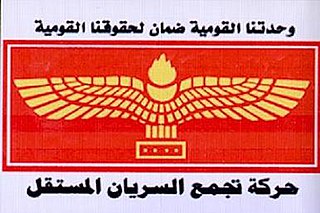
The Syriac Assembly Movement, formerly known as the Syriac Independent Gathering Movement, is an Assyrian political party from Iraq. The party's membership comprised mostly Assyrian Christians, particularly those who belonged to the Syriac Catholic community, and to a lesser extent those of the Syriac Orthodox Church.

Erbil, also called Hawler, is the capital and most populated city in the Kurdistan Region of Iraq. The city is the capital of the Erbil Governorate.

Tel Keppe is a town in northern Iraq. It is located in the Nineveh Governorate, less than 8 mi (13 km) northeast of Mosul.
Since the early 20th century several proposals have been made for the establishment of an autonomous area or an independent state for the Syriac-speaking modern Assyrians in northern Iraq.
Between 1 and 15 August 2014, the Islamic State of Iraq and the Levant (ISIL) expanded territory in northern Iraq under their control. In the region north and west from Mosul, the Islamic State conquered Zumar, Sinjar, Wana, Mosul Dam, Qaraqosh, Tel Keppe, Batnaya and Kocho, and in the region south and east of Mosul the towns Bakhdida, Karamlish, Bartella and Makhmour
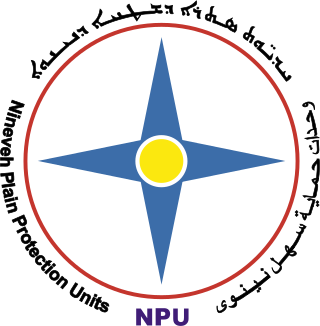
The Nineveh Plain Protection Units or NPU is an Assyrian paramilitary organization that was formed in late 2014, largely but not exclusively by Assyrians in Iraq to defend themselves against Islamic State of Iraq and the Levant (ISIL). The Nineveh Plains is a region where Assyrians originate from and have lived there for thousands of years.

The Shabak Brigade, also known as the Shabak Militia or Liwa al-Shabak, is an Iraqi armed group that was formed in 2014. The group was initially formed with around 1,500 militiamen in order to regain control of the Nineveh Plains from the Islamic State (ISIS).

Ano Jawhar Abdulmaseeh Abdoka, or Ano Abdoka is an Assyrian politician who serves as the Minister of Transportations and Communications of the autonomous Kurdistan Region of Iraq since July 2019. Abdoka leads the Shlama Trend for Christian Affairs in the Kurdish region, and he previously led the local committee of the Kurdistan Democratic Party in Ankawa. He is currently the only Assyrian and Christian member of the Kurdish Government's cabinet.

The Athra Alliance is a political alliance of five political parties in Iraq that represent the Assyrian people. The alliance comprises these five parties:

Rayan Salem Sadiq Al-Kildani, better known as Rayan al-Kildani, is an Iraqi Assyrian politician who serves as the general secretary of the Babylon Movement, as well as its military component, the Babylon Brigade. He rose to power after founding the party in 2014, which had initially been involved in defending the Nineveh Plains from ISIS when they were at their most active.
























